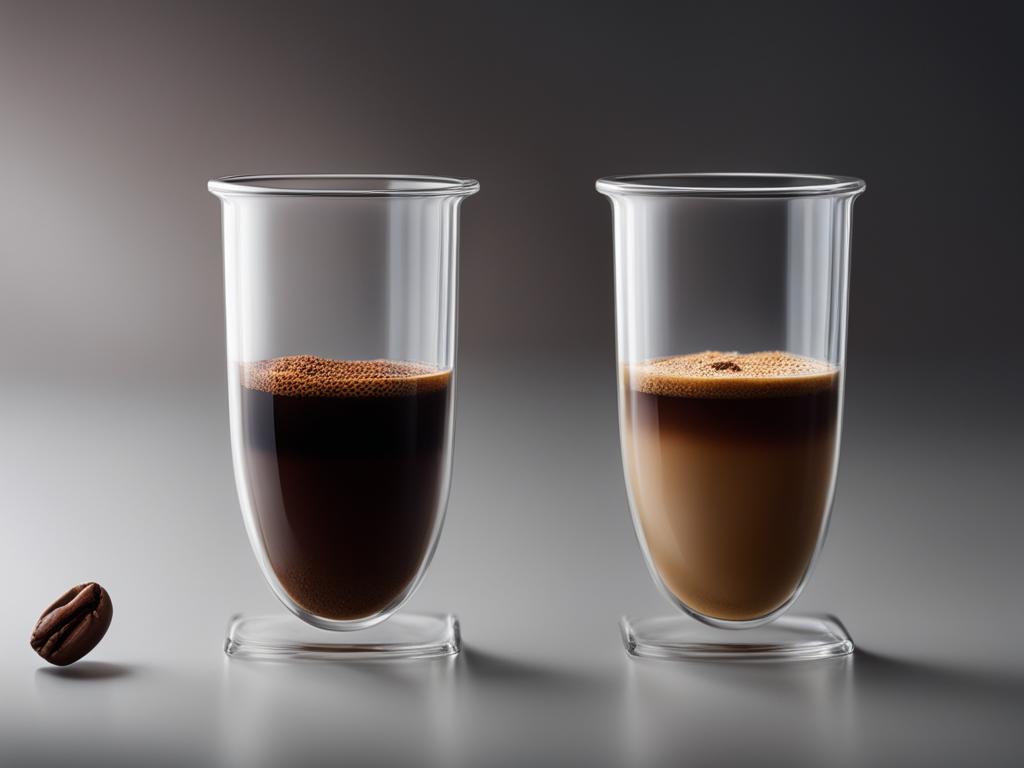Table of Contents Show
In recent years, the question of whether decaf coffee has a negative impact on cholesterol levels has become a topic of concern. With a growing number of individuals consuming decaffeinated coffee, it is vital to understand how it influences cholesterol levels. Many studies highlight the potential health benefits associated with coffee consumption, yet some suggest that decaf coffee and cholesterol levels may have a less favourable relationship. This article will discuss the effects of decaf coffee on cholesterol, the underlying compounds responsible for these effects, and the role of preparation methods in determining the overall influence of decaffeinated coffee on cholesterol levels.
As coffee drinkers seek to reduce their caffeine intake, substituting regular coffee with its decaffeinated counterpart often seems like a sensible option. However, this raises the question: is decaffeinated coffee harmful to cholesterol? It is essential to delve deeper into the factors affecting cholesterol levels in decaffeinated coffee and strategies that can help minimize any negative impacts on heart health.
Key Takeaways
- Decaf coffee’s effects on cholesterol levels are influenced by preparation methods and consumption quantity.
- Cafestol and kahweol, cholesterol-raising compounds present in coffee beans, affect cholesterol levels differently depending on the brewing technique used.
- Decaffeinated coffee may contain higher levels of cholesterol-raising oils due to the decaffeination process and choice of beans.
- Filtered coffee, whether caffeinated or decaffeinated, is less likely to raise cholesterol levels significantly.
- Factors such as the type of beans, brewing methods, and consumption quantity can be adjusted to make healthier choices in coffee consumption and minimize potential impacts on cholesterol levels.
Understanding Cholesterol: HDL vs. LDL
Cholesterol plays a vital role in maintaining various bodily functions, including cell building, vitamin production, and hormone regulation. The liver is responsible for naturally generating the cholesterol necessary for these processes, with additional cholesterol coming from dietary sources like animal products. It is essential to understand the difference between the two types of cholesterol – LDL, or ‘bad’ cholesterol, which can lead to plaque buildup in arteries, and HDL, or ‘good’ cholesterol, which aids in eliminating excess cholesterol from the body.

Functions and Importance of Cholesterol in the Body
Cholesterol serves several crucial functions within the body. These include:
- Cell membrane synthesis, providing structure and fluidity to cells
- Production of steroid hormones, such as cortisol, progesterone, and testosterone
- Formation of bile acids, which help in digesting and absorbing dietary fats
- Facilitating the synthesis of vitamin D from sunlight
Cholesterol is a fundamental component in various biological processes, highlighting its importance in maintaining overall health.
Distinguishing Between ‘Good’ and ‘Bad’ Cholesterol
Cholesterol comes in two main forms – low-density lipoprotein (LDL) and high-density lipoprotein (HDL). Each type has a different impact on cardiovascular health and cholesterol levels.
| Cholesterol Type | Description | Impact on Health |
|---|---|---|
| LDL Cholesterol (Bad Cholesterol) | Responsible for transporting cholesterol from the liver to cells in the body. | An excess of LDL cholesterol can lead to plaque buildup in the arteries, increasing the risk of cardiovascular events such as heart attacks or strokes. |
| HDL Cholesterol (Good Cholesterol) | Works to remove excess cholesterol from the bloodstream, transporting it back to the liver for disposal. | Higher levels of HDL cholesterol are beneficial for preventing plaque buildup in arteries, reducing the risk of cardiovascular disease. |
When considering the relationship between cholesterol and coffee consumption, it is crucial to identify both the type of cholesterol impacted and the amount of change in cholesterol levels. Decaf coffee’s influence on cholesterol levels, particularly LDL cholesterol, can make a difference in understanding its overall impact on cardiovascular health.
The Influence of Coffee on Cholesterol Levels

Decaf coffee is a popular choice for those seeking to reduce their caffeine intake, but its impact on cholesterol levels is an ongoing debate. This stems from the presence of cafestol and kahweol, natural compounds found in coffee oils, that can influence cholesterol levels. It is important to note that coffee’s effect on cholesterol is primarily determined by its preparation method, as filtering coffee can substantially reduce the presence of these oils in the final brew.
Research shows a clear link between the consumption of unfiltered coffee and elevated cholesterol levels, particularly when several cups are consumed daily.
In order to better understand the relationship between decaf coffee and cholesterol, we need to consider the following factors:
- Health effects of decaf coffee
- Cholesterol and decaf coffee
- Cholesterol levels in the body
- Effects of caffeine on cholesterol
While avoiding caffeine may be the primary goal for those opting for decaffeinated coffee, being conscious of the cholesterol levels in your cup is equally important, especially for individuals with existing cholesterol concerns.
| Factors | Decaf Coffee | Regular Coffee |
|---|---|---|
| Cafestol and Kahweol | Present | Present |
| Cholesterol-Raising Oils | Varies based on brewing method | Varies based on brewing method |
| Caffeine Content | Low | High |
In conclusion, decaf coffee’s influence on cholesterol depends on various factors, with emphasis on the brewing method and presence of cafestol and kahweol in the final product. Consuming unfiltered coffee is more likely to result in elevated cholesterol levels, while filtered coffee substantially reduces this risk. To manage cholesterol levels effectively, it is essential to consider not only the type of coffee but also its brewing method and quantity consumed.
Cafestol and Kahweol: Decaf Coffee’s Hidden Compounds

Decaffeinated coffee’s impact on cholesterol levels can often be traced back to two significant compounds—cafestol and kahweol. These substances, known as coffee diterpenes, are found within coffee beans and contribute to cholesterol regulation within the body. Let’s delve into the role these hidden compounds play in influencing cholesterol levels and the relationship between decaffeinated coffee and cholesterol-raising oils.
The Role of Cafestol and Kahweol in Cholesterol Regulation
The presence of cafestol and kahweol in coffee impacts cholesterol levels by impeding the body’s ability to break down cholesterol effectively. As these compounds suppress cholesterol breakdown, the levels of low-density lipoprotein (LDL) or ‘bad’ cholesterol increase. The amount of cafestol and kahweol that makes it into a cup of coffee is heavily influenced by the coffee brewing method utilized, ultimately affecting cholesterol levels.
Cafestol and kahweol play a significant role in cholesterol regulation by suppressing the body’s ability to breakdown cholesterol, particularly raising the ‘bad’ LDL cholesterol levels.
Decaffeinated Coffee and the Concentration of Cholesterol-Raising Oils
While it is often presumed that decaffeinated coffee presents fewer health concerns than regular coffee, it may contain higher levels of cholesterol-raising oils like cafestol and kahweol. The decaffeination process and the choice of coffee beans used can strongly influence the concentration of these oils.
The beans used for decaffeinated coffee typically require more oils to maintain their flavour after caffeine is removed. This results in a higher concentration of cafestol and kahweol in the final beverage.
- Decaffeinated Coffee preparation methods can influence cholesterol-raising oil concentration.
- Choice of coffee beans used for decaffeinated coffee impacts the oil content of the final brew.
- Decaffeinated coffee may contain a higher concentration of cafestol and kahweol, leading to increased cholesterol levels.
Unfiltered decaf coffee, in particular, presents a greater risk of elevated cholesterol levels compared to its filtered counterpart. Understanding the specific oil content and brewing method is crucial for those concerned with their cholesterol levels when choosing between decaf coffee options.
Assessing the Impact of Decaf Coffee on Heart Health
When considering decaf coffee and heart health, it is essential to examine both the filtered and unfiltered versions of the beloved beverage. These variations can affect cholesterol levels, an important factor in maintaining good cardiovascular health. Though substituting regular coffee with its decaffeinated counterpart might seem to promote a healthy heart, the key lies in scrutinising the specific type of decaf coffee and the brewing method to truly comprehend its impact on cholesterol levels.
Various aspects of decaf coffee’s production, such as bean selection and processing, can influence its cholesterol content. Decaf coffee made from oil-rich beans creates a richer flavour profile, but raises the risk of increasing cholesterol levels due to a higher presence of cafestol and kahweol. Furthermore, the brewing method is crucial – unfiltered decaf coffee maintains a higher volume of cholesterol-raising compounds compared to filtered decaf coffee.
“Though substituting regular coffee with its decaffeinated counterpart might seem to promote a healthy heart, the key lies in scrutinising the specific type of decaf coffee and the brewing method to truly comprehend its impact on cholesterol levels.”
To effectively evaluate the impact of decaf coffee on heart health, let’s look at some helpful tips for selecting the most cholesterol-friendly decaf coffee:
- Opt for filtered decaf coffee, as the filtration process removes a substantial amount of the cholesterol-raising elements cafestol and kahweol.
- Choose brands that use water processing methods for decaffeination, as these techniques retain fewer oils compared to solvent-based methods.
- Monitor your daily coffee consumption to keep cholesterol levels in check, as with both caffeinated and decaffeinated coffee.
In conclusion, understanding the nuances between filtered and unfiltered decaf coffee is crucial when determining its impact on heart health. Decaffeinated coffee is not a one-size-fits-all solution. Instead, it is essential to study your coffee’s type and brewing process to minimize cholesterol levels and maintain a healthy heart.
Filtered vs. Unfiltered Coffee: Implications for Cholesterol
The method of brewing coffee can significantly alter its impact on cholesterol levels. While many may be unaware of the differences between filtered and unfiltered coffee, the choice between these two brew techniques can have major implications for cholesterol levels and overall cardiovascular health.
How Brew Methods Can Alter Coffee’s Cholesterol Impact
Unfiltered methods, such as press coffee (also known as French press) or boiling ground beans, tend to leave the cholesterol-raising oils, cafestol and kahweol, in the brew. Due to their presence, consuming unfiltered coffee can result in elevated cholesterol levels for the drinker. Conversely, filtered methods, which include drip coffee and pour-over brewing, involve using a paper filter or fine mesh to eliminate these oils, making the coffee less likely to negatively impact cholesterol levels.
| Brew Method | Description | Cholesterol Impact |
|---|---|---|
| Unfiltered (Press Coffee) | Hot water is infused with ground coffee beans before being separated through a metal or mesh screen. | Potentially increases cholesterol due to the presence of cafestol and kahweol. |
| Filtered (Drip Coffee) | Hot water is poured over ground coffee beans, which sit atop a paper filter, allowing the liquid to drip through and leaving the oils behind. | Less likely to elevate cholesterol due to paper filters removing cafestol and kahweol. |
Decaf Coffee Preparation and Its Effect on Cholesterol Content
Decaf coffee preparation can also affect cholesterol content in varying ways. While studies suggest that switching to decaffeinated coffee does not lead to significant changes in serum cholesterol levels, understanding the specific oil content and preparation method is key for those concerned about their cholesterol levels. The use of filters can reduce the amount of cholesterol-raising compounds, making for a more cholesterol-friendly beverage.
It is essential to understand the specific oil content and preparation method of decaf coffee for a more accurate assessment of its impact on cholesterol levels.
Ultimately, making the switch from unfiltered to filtered coffee, whether it is caffeinated or decaffeinated, can provide a safer option for those with high cholesterol or those looking to maintain healthy cholesterol levels. By understanding the differences between brewing methods and the potential effects on cholesterol levels, individuals can make more informed decisions about their coffee consumption.
Conclusion
In summary, decaf coffee’s impact on cholesterol depends on factors such as the preparation method and consumption quantity. Filtered coffee, be it caffeinated or decaffeinated, is less likely to raise cholesterol levels appreciably. It is essential to bear in mind that excessive coffee consumption and additional ingredients, such as cream or sweeteners, can further impact cholesterol.
A balanced approach to coffee consumption, with an awareness of its possible effect on cholesterol, is recommended for sustaining heart health. Decaffeinated coffee does not have unanimously negative effects on cholesterol and can still contribute to a healthy lifestyle when consumed in moderation. Choosing the appropriate brewing methods and filtering the coffee can further enhance its benefits.
Ultimately, the benefits of decaf coffee are present and can be realised when taking a mindful approach to consumption and brewing methods. Monitoring and maintaining balanced coffee consumption can positively impact cardiovascular health, providing further reason to enjoy this beloved beverage.
FAQ
Is decaf coffee bad for your cholesterol?
Decaf coffee can potentially affect cholesterol levels depending on the preparation method and coffee bean choice. Filtered decaf coffee is less likely to negatively impact cholesterol levels.
What are the functions and importance of cholesterol in the body?
Cholesterol is vital for various bodily functions such as cell building, vitamin production, and hormone regulation. The liver naturally generates necessary cholesterol for these processes, but additional cholesterol comes from dietary sources like animal products.
How does coffee affect cholesterol levels?
Coffee, including decaf coffee, can contain natural compounds called cafestol and kahweol that impact cholesterol regulation. The brewing method heavily influences the presence of these compounds in the final brewed coffee. Filtered coffee is less likely to increase cholesterol levels than unfiltered coffee.
What role do cafestol and kahweol play in cholesterol regulation?
Cafestol and kahweol are compounds found in coffee oils that can suppress cholesterol breakdown, leading to increased levels of LDL or ‘bad’ cholesterol. The amount of cafestol and kahweol in coffee depends on the brewing method, with filtered coffee containing lesser amounts.
How does decaf coffee impact heart health?
The impact of decaf coffee on heart health depends on the preparation method and the type of decaf coffee consumed. Drinking filtered decaf coffee, and consuming coffee in moderation, generally has a lower impact on cholesterol levels and is better for overall heart health.
How do brewing methods affect the cholesterol content of coffee?
Brewing methods can significantly impact the cholesterol content of coffee. Filtered methods, such as drip coffee machines, tend to remove cholesterol-raising oils like cafestol and kahweol. In contrast, unfiltered methods like French press or boiling ground beans retain higher amounts of these oils, increasing the risk of elevated cholesterol levels.




